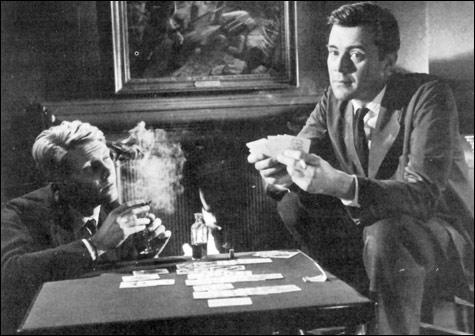
THE SERVANT: Self-consciousness and fruity whining — but it still fascinates. |
From the beginning of his career in movies, Joseph Losey was persecuted — chased out of town. His films are melodramatic, political, and weird, marked by noirish hysteria or arty creepiness. But it’s unclear whether persecution accounts for the strange combination of outrage and interiority that defines his work.
That’s because it’s been hard to look back over Losey’s œuvre. His pictures are scattered, products of several countries made over 46 years, infrequently revived, rarely grouped together, barely represented on DVD. What is clear is that he had an innate sense of persecution and conflict that initially found expression in the right place at the wrong time — Hollywood in the late 1940s, during the House Un-American Activities Committee’s anti-Communist witch hunts.
Together at last, all of his films are showing in the Harvard Film Archive’s retrospective “The Complete Joseph Losey,” which runs through August 11. He made several shorts in New York and at MGM before embarking on his first feature, and these are included in the HFA series as well. With 1948’s THE BOY WITH GREEN HAIR (July 12 at 7 pm), his first full-length work, Losey established himself as a director of a new kind of socially conscious and hyper-sensitive post-war melodrama — “sensitive” in a child-psychology sense: touchy, prone to violence.
An anti-racist and anti-war parable, The Boy with Green Hair could have been approved only under a studio regime of engaged liberalism like the one headed by Dore Schary at RKO. At the same time, the film was a victim of the increasing right-wing paranoia of its day. Its producer, Adrian Scott, was blacklisted and fired. Losey was cast adrift in the RKO of Howard Hughes, where movies with titles like I Married a Communist became standard.
A film about persecution, The Boy with Green Hair tells the story of a war orphan (Dean Stockwell) ostracized by his town after he wakes up one morning to find that his hair has turned a deep punk-rock green. Right from the beginning, persecution is inscribed into the work of a director who would soon be forced out of Hollywood under the blacklist. The film is a prescient mixture of classroom civics lesson and mass hysteria. By turns sentimental and tough, it shows small-town America as a crimped, herd-like place where the slightest disturbance throws the social order out of whack.
Dean Stockwell breaking a bottle of milk in a grocery store, crying in the grass, meeting imaginary European war orphans in the woods — the film’s best scenes are the ones Losey judged least successful in a 1968 interview book.
It was scenes like those from Losey’s initial American films, however, that excited French auteurists. After The Boy with Green Hair, he managed to make four more movies before getting himself permanently kicked out of Hollywood. Hard to track down even today, these medium-to-low-budget quickies, made during a period of industry-wide economic and political turmoil, reveal a director in the same league with Robert Aldrich and Nicholas Ray. Both men had worked for Losey, Aldrich as his assistant director, Ray on the “Living Newspapers” of 1930s New York, which Losey directed for the Federal Theater Project.